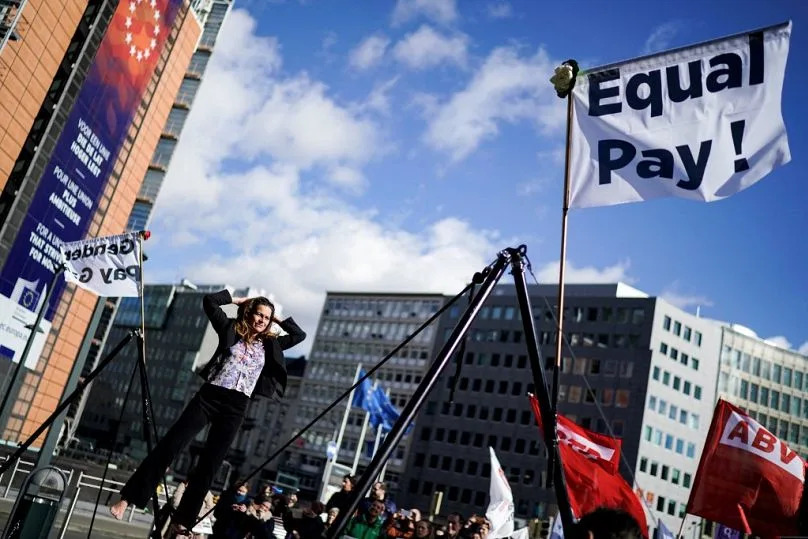Ritu Mohanka, Managing Director, EMEA, Syndio
Fri, 5 May 2023

The gender pay gap has been a hot topic for far too long, with both companies and governments feeling the pressure to enforce plans to address disparities in pay.
With change looking imminent, the latest figures show that the gender pay gap has narrowed from 11% in 2018 to 10.1% in 2023.
Many campaigners celebrate this progress as an indication that positive change is finally materialising with tangible figures to back it up.
Equal Pay Day: EU women now working 'for free' until end of the year
Equal Pay Day: How bad is the gender pay gap in your country?
Despite this optimism, a new PwC report has found that an 18-year-old woman entering the workforce today may still not see pay equality throughout her employment, suggesting that, in fact, there is still a lot of work to be done.
Are employers taking their foot off the gas? Potentially.
We should talk about the Confidence Gap
Recent campaigning for pay and opportunity equity has focused a lot on structural barriers such as childcare costs, which, while a significant part of the problem, does create a risk that individual employers are starting to perceive the cause of the pay gap as something external and "out of their hands".
This is wherein the problem lies. Yes, gender pay gaps have marginally narrowed, but pay equity has still not been achieved, and there is a lot employers can and need to do.
A less addressed equity issue can be recognised in the Confidence Gap. This refers to a disparity in salary resulting from the differing confidence levels of male and female employees — an issue which lies firmly in employers' spheres of influence.
The survey found that 69% of women feel anxiety or worry around negotiating pay, while nearly half of all men feel confident about it.

A woman walks up the decorated stairs of the Commerzbank in Frankfurt, March 2023 - AP Photo/Michael Probst
New UK data released by Syndio found that employers are not doing enough to address the Confidence Gap and the role it plays in hindering pay equity.
The survey found that 69% of women feel anxiety or worry around negotiating pay, while nearly half of all men feel confident about it, with 16% of those men even seeing it as a positive boost to their self-perception.
The top feelings for women when negotiating salary are a fear of being rejected (25%), lack of confidence (23%), and concern about being seen as "pushy" and risk damaging their career (21%).
Highest levels show significant disparities, too
The gender pay gap is largely caused by disparities at organisations' highest levels and a lack of visibility for women in senior leadership teams.
Men with higher incomes (those earning more than the UK average of £33,000) are more likely to be aware of their market value and to be prepared to negotiate.
Meanwhile, women with higher incomes continue to follow the general trend of being overly concerned about negotiations.
Ultimately, higher earners are more likely to demand and receive more.

A girl holds up a sign for equal pay for the US women football players in West Hartford, CT, April 2016 - Jessica Hill/AP
Ultimately, higher earners are more likely to demand and receive more.
When female employees are worried about navigating discussions about their salary within the workplace, it can lead to a range of negative outcomes, including reduced job satisfaction, resentment, lack of recognition and burnout.
In turn, this detrimentally affects an organisation's performance and ability to retain talent.
Transparency helps, but it isn’t a silver bullet
We know that pay transparency can help reduce pay disparities by making it easier for employers to compare their salaries.
It also promotes fairness and equity by creating a culture of openness and trust within an organisation.
But while transparent companies will tend to be seen as making progress in closing the gender pay gap, the Confidence Gap will ensure the problem persists.
Simply rewarding men for being more confident in the workplace is inexcusable.

Slovenia's Irena Joveva, center, has her baby on her kneels as European Parliament members vote to strengthen the application of the principle of equal pay, April 2022 - AP Photo/Jean-Francois Badias
Women are proven to be more likely to value themselves lower when entering the workplace, and the confidence gap prohibits them from reaching for the top of salary pay bandings and merited promotions that reflect the value they contribute to the workplace.
Simply rewarding men for being more confident in the workplace is inexcusable.
Businesses need to be accountable for addressing imbalances, looking at workplace equity more holistically and providing employees with the tools and opportunities to achieve their full value and potential.
How should we address pay imbalance?
For employers, alleviating the worries and stresses of employees means proving that fair pay and opportunities for all are embedded within the business — and shouting about it.
A system which leverages real-time company data is highly effective at any stage of your pay equity journey.
It’s time to pay the sisters the same as the misters!
Women won't get equal pay for 257 years, new report says
You don’t need a polished data set, and simply starting to understand where gaps exist in how you pay and promote employees is worthwhile.

A dancer performs to demand equal pay and gender pay transparency in front of the EU headquarters in Brussels in February 2020 - KENZO TRIBOUILLARD/AFP
A data-based approach also offers employees tangible evidence, beyond words, that demonstrates that they are valued and treated fairly, and that their employer is acting seriously.
_Ritu Mohanka is the Managing Director for Europe, Middle East and Africa at Syndio, a workplace equity platform.
_
At Euronews, we believe all views matter. Contact us at view@euronews.com to send pitches or submissions and be part of the conversation.
EQUAL PAY PLUS

No comments:
Post a Comment